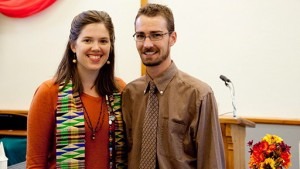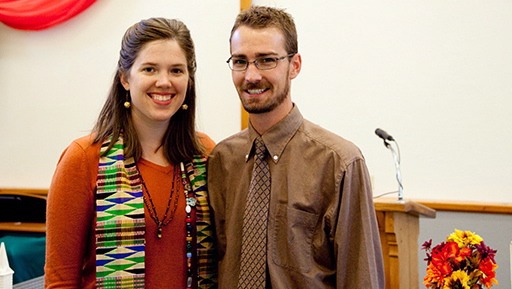
Last month, I interviewed Nathan Soule-Hill of Family of Christ Presbyterian Church in Greeley, Colo. He and his wife, Jennifer, co-pastor a congregation that serves more than a dozen immigrant families. (Over the last several years, Greeley has been at the center of two highly publicized immigration-focused government raids. In 2008, the Weld County district attorney raided a local tax preparer, and in 2006, federal agents raided six meat-packing plants employing undocumented workers.) The highlights of the interview, which touched on the nature of immigration and the relationship of immigrants to mainstream America, are included below in a question-and-answer format.
Question: Tell me about your work. How long have you been in Greeley?
Answer: Since December 2009, which was three years after the major raids on the meat-packing plants here. It wasall over the news and really shook the community. For a long time our church’s focus has been on providing human aid, because many of the families affected by the raid are still working and living in the community, their kids are still going to school. So we have helped provide basic needs, give food aid weekly though a food pantry in the kitchen of our church. We began a partnership with Al Frente de Lucha Center, and re-stock food when needed. There used to be about 25-30 families involved, but now we are down to around 10-12 families.
Question: How did you end up in Greeley?
Answer: My wife and I had been searching for a church where we could be co-pastors. My wife was in Chicago working with the new sanctuary movement centered on immigration justice and immigration reform, and she knew about the raids that took place in Greeley. We wanted to serve a church whose ministry included relationship building with immigrants and working for social justice, and heard this church was looking for a pastor whose role would involve ministry among the local immigrant community.”
Question: Tell me about a “typical” sort of relationship you have with an immigrant family at Family of Christ.
Answer: Well, we are in the midst of trying to build deeper relationships with people and make them feel welcome and part of the community. More than anything we try to establish a mutuality in relationship, where we’re working together and asking how can we contribute together to become a better community. In other words, we want to establish right relationships with our immigrant brothers and sisters.
Question: What does “right relationship” look like for you and Jennifer?
We go with families to court proceedings they might have, just to accompany them and be present. The presence of people of faith in courtrooms can have an effect on the proceedings, but more than that we just want to be friends to these families and provide moral support. The judge sometimes asks us to identify who we are, but that’s about the extent of what the court asks us. During the appeals process we have an opportunity to write letters on behalf of families, and recently we had our congregation sign a petition letter as they came up to take communion. This letter was written in support of one of our neighbors, a hard-working mother of a U.S. citizen child, who was in the midst of deportation proceedings. The letter stated it might be a danger to her if she returned to her home country…She was detained at work, as part of the ’06 raid.
Question: Is it difficult to get other faith communities to get involved in helping to care for the basic needs of immigrant families?
Answer: Well, local Catholic churches continue to minister to immigrant families who attend their parishes. But…there is so much fear and tension around the issue of immigration that keeps churches from taking the risk to get involved. It’s more than a little ironic, given how clearly the Bible tells us to care for the immigrants among us. But Greeley is a community that’s divided on the issue [of immigration]. It probably reflects the [U.S.] political culture as whole. I think everyone can recognize that the immigration system is broken, but consensus on how to fix it can be elusive. So much attention gets focused on the protection of our borders, but so little gets focused on real people that immigration policy affects.
Question: Tell me more about how you look at the immigration issue.
I think for most people in Greeley, immigration is a hidden issue. We’re trying to grow into giving the issue a voice, to tell some of those stories. Immigration, even as much as it’s talked about in the media and politics, is abstract. So we’re learning to help tell [immigrants’] stories and learning to put a human face on the issues. Our hope is that humanizing the issue will open people to new perspectives. Not everyone will know an immigrant family or see the inside of an immigration courtroom, but sharing our experiences of these things invites others into the story.
Question: Tell me about one of the families you know.
Answer: Actually, we were with one today. It’s a family that comes from Guatemala, with four young children that are between the ages of four and 12 years old. They are just a lovely, hard-working family. In fact, their children are some of the best friends of my one-year-old son. This family is going through a tough time right now because the husband is working at a dairy here in Weld County, and all of the sudden has come down with a bacterial infection. He’s being paid under the table because he doesn’t have documentation. He’s making a salary just enough to get by. And his family of six lives in a studio apartment with one bed for all of them. They aren’t able to pay for health insurance, so he has to go to urgent care. He has headaches and his feet have terrible pains, but his employer is telling him now that if he doesn’t come back to work today he doesn’t have a job [anymore]. So he’s having to go put in a full day working in the dairy, which is extremely taxing labor, when what he needs to be doing is resting. It’s really heart-breaking.
Question: What are some things you try to do for immigrant families in your church?
Answer: The extent of what I can do as a pastor and as a human being is to go and to be present with them and let them know there is a community that is thinking about them and praying with them. Part of what we can do as a community is to provide support and love and encouragement as they are going through difficult times. That’s what right relationship is all about. We also certainly point to the need for legislative change. We hope our country has the courage to take on comprehensive immigration reform. We realize that major change often happens from the bottom up. It’s about making people aware of the hardship that goes on in immigrant communities, and just educating people about trade policies that force immigration. The United States is in great need of immigrant labor. We need people to pick crops, wash dishes and do hundreds of other jobs that our own people aren’t willing to do. There is a real reliance on that, and it lowers the price of products we buy. And yet we are incredibly ungrateful and treat these people as second-class human beings. We don’t afford them legal protections that allow them to be equal members of a multicultural community. But it’s not just about what we can do for these immigrant families but what their presence does for us. We find our hearts and minds changing and realize that the immigrants in our midst have the power to transform us. Relationships teach you that. The psychologist Carl Jung once said something to the effect of “The meeting of two human beings is just like that of two chemical substances—if there is any reaction, then both are transformed.”
Question: You referred to the Beatitudes from the Gospel of Matthew earlier. Could you talk a little more about how they relate to your perspective on immigration?
Well, Jesus said “Blessed are the poor” not because God wants people to be poor, but because there is a certain blessing that comes from utter reliance on God. There’s a certain gift in being totally dependent, and it’s one that we don’t often recognize. There’s a real spiritual poverty in the United States that immigrant families don’t share. Migrant workers know what it’s like to be dependent upon something wholly outside of themselves. Isn’t that what spirituality is all about? I find that these relationships with immigrant families disavows me of the myth of utter self-reliance.
Question: As far as you know, where do most immigrant families work now?
Answer: Well, there’s a lot of agriculture and industry here, and, of course, there’s meat packing.
Question: How did you become so passionate about immigrant rights?
Again, it comes down to the human connection. Part of it for me was I lived a year in Chiapas [Mexico], and I got to see the effects of trade policy first-hand. Everyone in that community had someone in their family that migrated north because of the lack of opportunities in their homeland. You know, the Mayan region is the birthplace of corn. Mayans call themselves “people of the corn.” To them it’s a sacred crop. And they will grow it there in the most inhospitable places. In 1994, NAFTA [the North American Free Trade Agreement] passed and dumped [onto the market] huge quantities of U.S.-grown corn. How is a small-scale Mexican farmer going to compete with subsidized U.S. agribusiness? That trade policy completely undermined the subsistence farmer [in Mexico]…And from there, it devastated the rest of the economy. So for me just to see it on a personal level, it makes you ask “What would I do in this situation?” You have a young man who has no opportunity to improve his life economically, to find employment that is going to satisfy his creative desires, and so they come to the U.S.
Question: What are some things you’ve found that most immigrant families have in common?
Well, most families send money home [to relatives in their native country]. If you’re fortunate enough to make it to the United States, it’s a given that you send money home. You will make the same in an hour here as you would make in a whole day in Mexico. Part of the agreement is if you’re fortunate enough to make it, then you send money home and support your family. Many people will hear that and think, “Well, if migrant laborers are able to send money home, they must be doing pretty well.” Yet, by our standards, they do live life in poverty. That’s something you see as you walk into their apartments or their houses. They’re willing to do what it takes to survive, whether it means living in a single room house and living with two or three other families. They typically live in conditions that are unthinkable to most people who live here. They go without health insurance. They work very hard. Their work ethic is beyond any that I’ve ever seen. It takes a certain kind of determination to cross an international border without documents and to make a long journey from their homeland, so these people are extremely driven. They mostly just want to provide better opportunities for their children and to do that they’re willing to do whatever it takes.”


